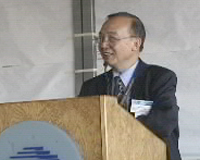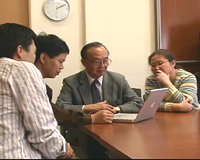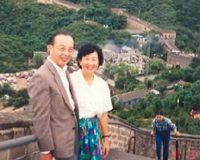UCSD Bioengineer Shu Chien Accepts Lifetime Achievement Award
|
|
San Diego, CA, February 28, 2005 -- University of California, San Diego bioengineering professor Shu Chien received the Distinguished Lifetime Achievement Award from the Asian American Engineer of the Year (AAEOY) Awards Committee on February 26. Chien was cited for his pioneering work in the field of bioengineering and the role he has played in grooming the next generation of Asian American bioengineers. The award was presented during National Engineers Week at the Hanover Marriott Hotel in Whippany, NJ.
"With Dr. Chien's outstanding achievement in bioengineering and support of Asian Americans in engineering and medicine, he is a model for the technical community to follow," said Ted Lee, chairman of the Chinese Institute of Engineers-USA National Council, which organizes the annual awards. "He joins a distinguished roster of engineers who have won this award, including professor Y.C. Fung, the founder of UCSD's bioengineering program, who received the award last year."
Shu Chien is the founding chair of the Jacobs School of Engineering's Bioengineering department - consistently one of the top three in the nation - but he started out in medicine and physiology. "I picked up engineering midway in my career," said Chien, 73, who grew up in Shanghai and was a premed student at National Peking University when the Communist revolution began. His father was a professor of chemistry at the university, and the family was evacuated to the south and ultimately Taiwan: "If we had stayed in China, given the later Cultural Revolution, my brothers and I probably would not have had the college educations that we were fortunate to get."
|
||||
The middle of three sons, Chien received his medical degree from National Taiwan University. Rather than practicing clinical medicine, he entered a Ph.D. program at Columbia University in physiology, and joined the faculty in 1958 after receiving his doctorate. Ten years later, he co-authored three high-profile articles in the journal Science about the deformability and aggregation of red blood cells.
Chien remained at Columbia until 1987, when he took an extended sabbatical to set up Taiwan's Institute of Biomedical Sciences. The faculty and staff went from zero to nearly 200 in 18 months, said Chien, "and since then several thousand young scientists have been exposed to the introduction of new technologies and new concepts in biomedical sciences."
In 1988, Chien returned to the U.S. - but not to Columbia. He was recruited by Y.C. Fung and Benjamin Zweifach, who co-founded the bioengineering program at UCSD with Marcos Intaglietta. Said Fung, now an emeritus professor: "I regard recruiting Shu as my greatest contribution to UCSD."
|
UCSD recruited Chien as a professor in both Bioengineering and Medicine. He brought with him a cadre of Columbia researchers, including long-time collaborator Richard Skalak and two young investigators, Paul and Amy Sung. "He has a charming personality and persuasive powers," said Amy Sung, who co-edited a tribute book for Chien on his 70th birthday in 2001. "People around him are very willing to work together with him to achieve common goals."
"We added a new dimension to the already strong bioengineering program, which had been strong in biomechanics and microcirculation, because Drs. Fung and Zweifach were considered founders of these two fields, respectively," recalled Chien. "What we brought here were the cellular and molecular approaches to bioengineering."
In 1991 he created a cross-campus institute and led the successful effort to win a $5 million, five-year award from the Whitaker Foundation (one of only three from a field of over 60 original proposals). The center was interdisciplinary, with an emphasis on tissue engineering science. It was eventually renamed the Whitaker Institute of Biomedical Engineering.
In 1994, UCSD officially created a Department of Bioengineering, with Chien as founding chair - a position he holds today. "Our mission has always been to do integrative bioengineering," said Chien. "By that we mean integrating biomedical sciences and engineering sciences together, and integrating across the biological hierarchy, from genes to molecules to cells to tissues to organs and to systems."
In 1998, Chien led a second effort with the Whitaker Foundation and the Charles Lee Powell Foundation which gave $25 million towards a bioengineering building at UCSD. Since moving into the Powell-Focht Bioengineering Hall two years ago, Chien has hired five new faculty members and launched a multi-campus research unit with the nine other UC campuses. "Dr. Chien is really a great leader," said professor Amy Sung. "He sets very high standards for himself and for everyone around him, and he does everything so well, whether he's writing grants, publishing papers, educating students, or managing activities in the scientific community."
Chien is widely credited with building the UCSD Bioengineering department into a world class institution, with a focus on multi-scale bioengineering, tissue engineering, and systems biology. UCSD is ranked the #1 Ph.D. bioengineering program in the country according to a National Research Council survey, and the #2 graduate program according to U.S.News and World Report.
The author of more than 400 peer-reviewed journal articles and editor of nine books, Chien's own research has focused in recent years on the effects of mechanical forces - pressure and flow - on molecular events in endothelial cells. "How do these cells respond to mechanical forces and signal genes to change their expression?" he asked. "When genes change their expression, the proteins will change, and proteins are the major determinants of functions of cells such as growth, migration and programmed cell death. So mechanical forces can govern these important cellular functions, and we want to know how they achieve that."
|
In February 2004, Chien and postdoctoral researcher Yingxiao Wang received a grant from the Jacobs School's von Liebig Center for Entrepreneurism and Technology Advancement to do proof-of-concept testing of a biosensor they developed to detect kinase activity in live cells. The process is based on an optical technology which allows the real-time measurement of kinase activity with high temporal and spatial resolutions in live cells. Chien and Wang believe their invention could be a powerful tool to diagnose efficiently and conveniently the different developmental stages of cancers, e.g. in a biopsy or a pap smear sample.
Chien is a member of the National Academy of Engineering, the Institute of Medicine, and Taiwan's Academia Sinica. In 2002, Chien was named a University Professor, a distinction held by only 20 faculty members in the entire University of California system.
Chien and his wife K.C., who graduated from medical school two years after he did, returned to mainland China in 1995 - 46 years after fleeing.
"I think beyond being nice he's very diligent and considerate," said Bert Fung, who recruited Chien to UCSD. "He has an infinite capacity for observing and digesting everyone's point of view, and coming up with a pertinent, satisfying decision that makes everybody happy. That is unusual."
Media Contacts
Media Contact: Doug Ramsey, (858) 822-5825, dramsey@ucsd.edu
Related Links
UCSD Bioengineering Department
Vascular Bioengineering Laboratory
The Whitaker Foundation
Whitaker Institute of Biomedical Engineering
The von Liebig Center for Entrepreneurism and Technology Advancement
Chinese Institute of Engineers-USA





